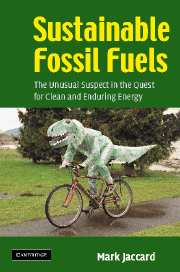Book contents
- Frontmatter
- Contents
- List of figures
- List of tables
- Preface
- Acknowledgments
- 1 What is energy sustainability?
- 2 Is our current energy path sustainable?
- 3 The prospects for clean secondary energy
- 4 The usual suspects: efficiency, nuclear and renewables
- 5 The unusual suspect: how long can fossil fuels last – and does it matter?
- 6 Can we use fossil fuels cleanly – and what might it cost?
- 7 Sustainable energy choices: comparing the options
- 8 Sustainable energy policy: how do we get there?
- 9 Broadening the definition: is sustainable energy sustainable?
- Bibliography
- Appendix ‒ synopsis and chapter reading guide
- Index
3 - The prospects for clean secondary energy
Published online by Cambridge University Press: 06 July 2010
- Frontmatter
- Contents
- List of figures
- List of tables
- Preface
- Acknowledgments
- 1 What is energy sustainability?
- 2 Is our current energy path sustainable?
- 3 The prospects for clean secondary energy
- 4 The usual suspects: efficiency, nuclear and renewables
- 5 The unusual suspect: how long can fossil fuels last – and does it matter?
- 6 Can we use fossil fuels cleanly – and what might it cost?
- 7 Sustainable energy choices: comparing the options
- 8 Sustainable energy policy: how do we get there?
- 9 Broadening the definition: is sustainable energy sustainable?
- Bibliography
- Appendix ‒ synopsis and chapter reading guide
- Index
Summary
The growth depicted in the last chapter appears overwhelming in aggregate: global population almost doubling, economic output growing to seven times its current level and the energy system expanding more than three-fold. At this mammoth scale, how can any conceivable energy system satisfy my definition of sustainability? How can primary energy supplies meet this enormous need and, if they can, at what cost? How can the biogeophysical system absorb the waste products of our development and use of energy without suffering irreparable harm? What are the prospects for providing clean secondary energy for our daily needs?
While this book addresses all of these questions, this chapter focuses only on the last of them – the prospects for clean secondary energy. The chapter's brevity is not an indication of the unimportance of this issue, nor of a lack of controversy. Rather, it reflects the fact that the secondary energy issue is less complex; the options are fewer and the trade-offs more straightforward. Electricity is a clean form of secondary energy of which everybody wants more. Its use will expand through the century, dramatically so in developing countries. There are, however, end-uses for which electricity is less favorable relative to various forms of gaseous and liquid hydrocarbons, notably fuels for transport. While these end-uses have traditionally been met by combustion of refined petroleum products (gasoline, diesel, jet fuel, propane, butane) and natural gas, the resulting emissions are especially problematic for our sustainability concerns for urban air quality and atmospheric greenhouse gas concentrations.
- Type
- Chapter
- Information
- Sustainable Fossil FuelsThe Unusual Suspect in the Quest for Clean and Enduring Energy, pp. 56 - 78Publisher: Cambridge University PressPrint publication year: 2006



